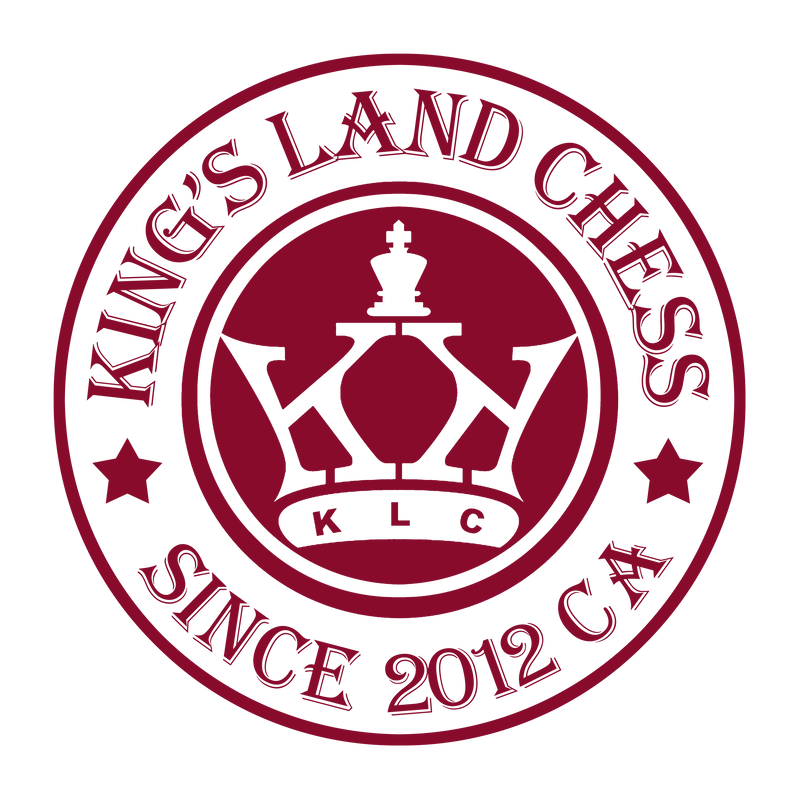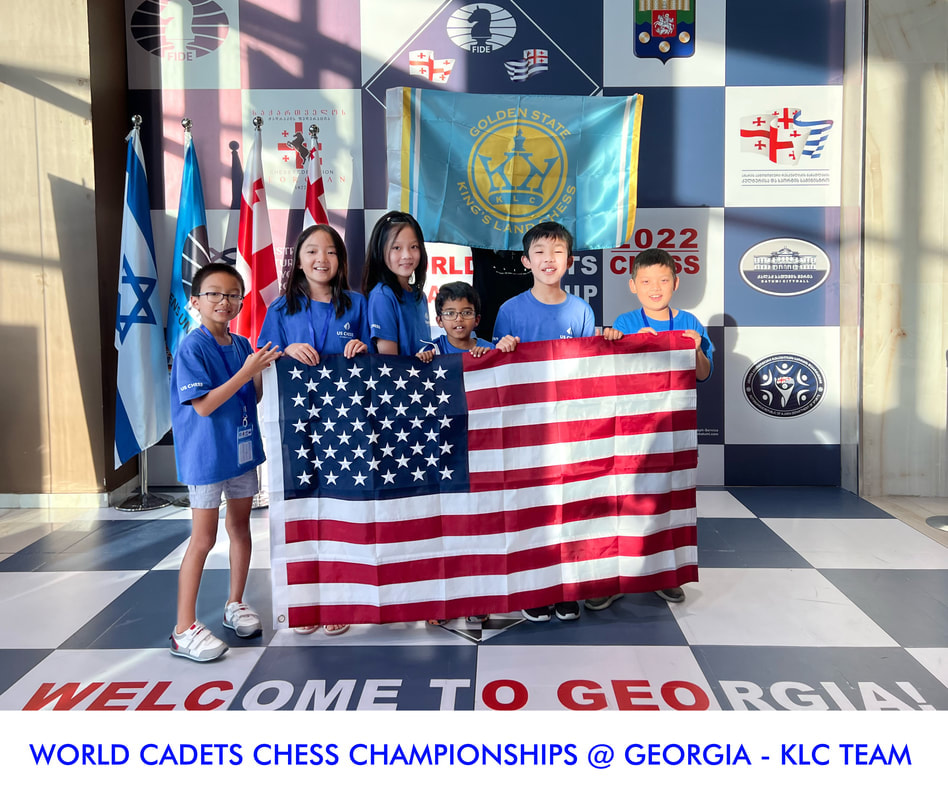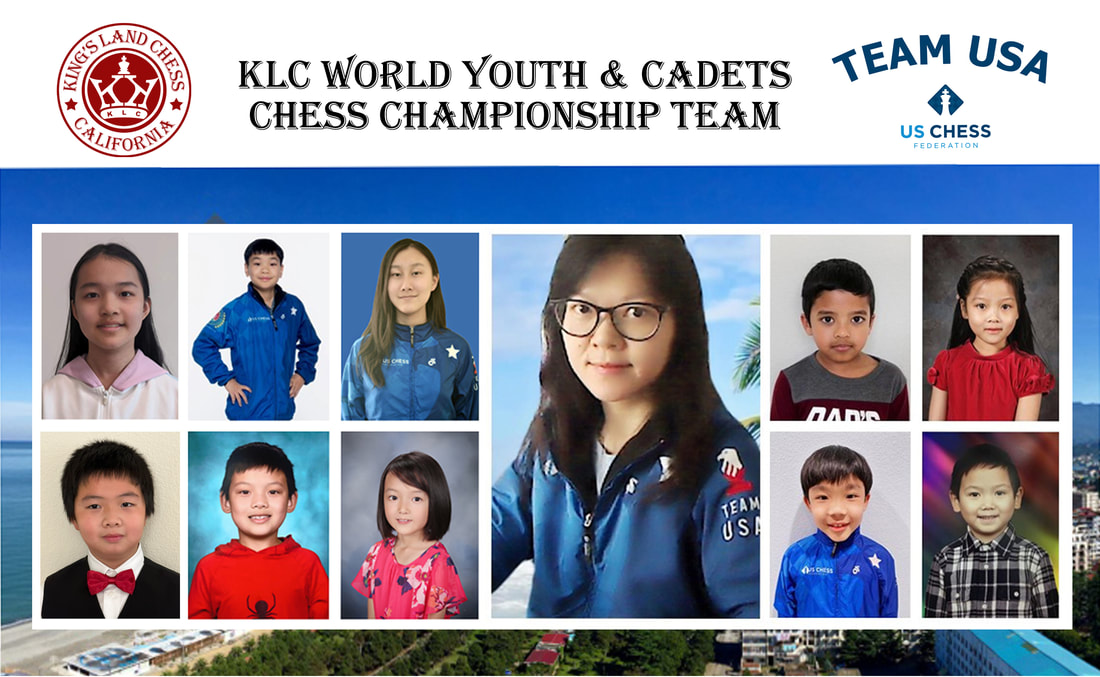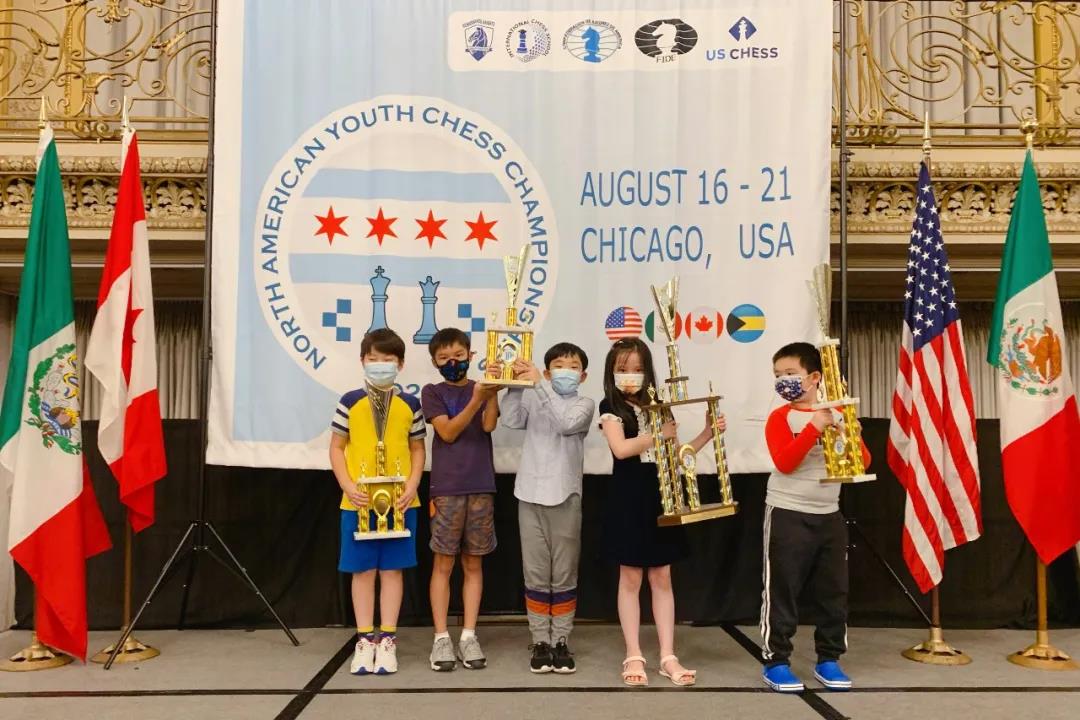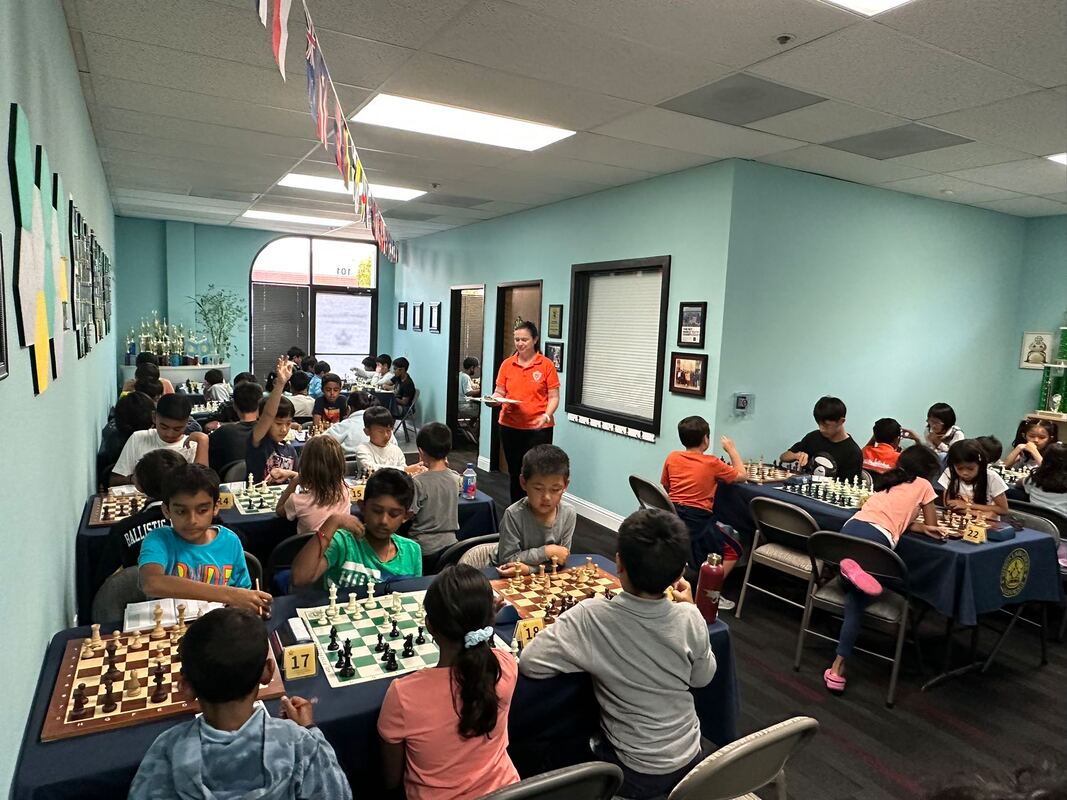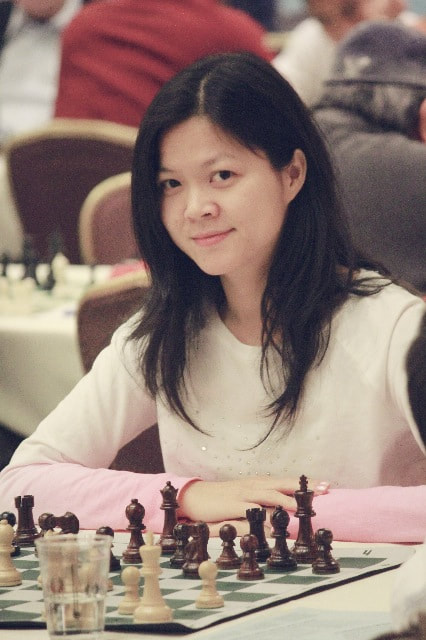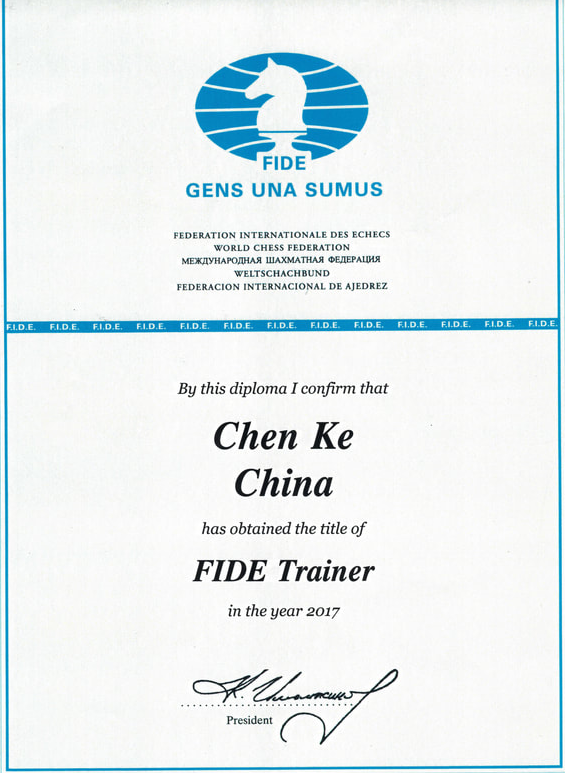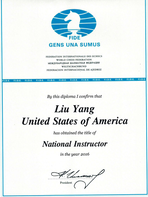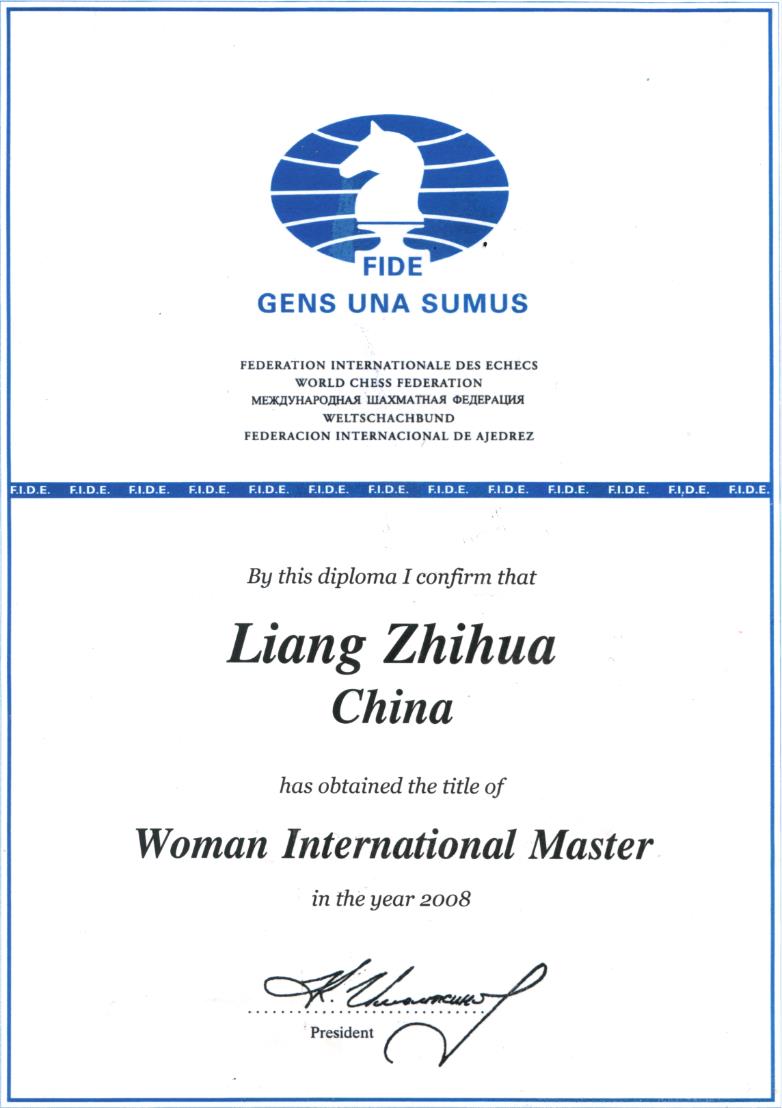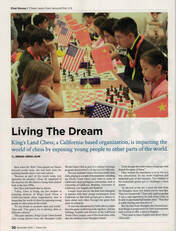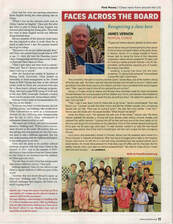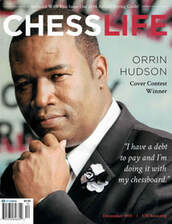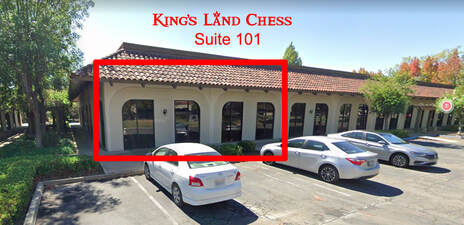|
King’s Land Chess is Northern California East Bay based professional chess academy focuses on improving youth chess education, founded by WFM Coach Kiki Chen in 2012. KLC has a complete and systematic teaching system from beginner to master level. Professional chess training by World Chess Federation FIDE certified coaches, with the supporting series of chess curriculum created by Coach Kiki and guided by FIDE training guideline.
KLC offers nine levels of chess class from New Beginner level to National Master level, including regular group class, small group class, Intensive Training Camps, Private Lessons, GATE program (former KLC US Team class) and rated tournaments. Students will receive systematic training suitable for their level at each stage, efficiently and gradually improve their chess skills. We dedicated our entire career to helping children to develop their critical thinking through chess and strengthen their mentality for the reality the children will face in their near future. As highly experienced chess coach in youth chess education, we have made it our mission to create awareness in parents of their influence and impact on their child and world they live in. We aim to develop successful chess kids who excel not only in the game, but in life. Chess for World, Wisdom for Life. Over the past eleven years, KLC has trained thousands of young chess players and won many championships in world, national and state tournaments. Each year, several students are qualified for the World Youth/Cadets Championship Team USA.
In the US August 2022 Top Player list, KLC students are ranked No.1 and No.2 in several age groups. http://www.uschess.org/component/option,com_top_players/Itemid,371/ • In Top Age 7 and Under, Rocky Wang (1845) is ranked No. 2; • In Top Age 8, Lerui Zheng (1886) is ranked No.2; Young Cui (1804) is ranked No. 7; Suhas Indukuri (1695) is ranked No.15; • In Top Age 10, Patrick Liu (2100) is ranked No. 1, All American Team; Jashith Karthi (1933) is ranked No. 13; • In Top Girls Age 10, Jenny Qi (1654) is ranked No.1; Ruyi Hu (1474) is ranked No.6; • In Top Girl Age 9, Iris Li (1908) is ranked No. 2, Tianmu Wang (1376) is ranked No.15, Melissa Xu (1334) is ranked No.17; • In Top Girl Age 16, Chelsea Zhou (1845) is ranked No. 11. |
金仕澜国际象棋教育中心位于美国北加州湾区,由Kiki教练创建于2012年,专注于青少年国际象棋教育的发展与提高。KLC秉承学院派的体系与严谨,采用系统化的教学及训练方法。将知识细化分级,由浅入深,创建从零基础班,中高级班,精英班,天才班,至国家大师班等8个级别的完善的教学体系。KLC教学使用我院自己编写的配套系列教材。该教材以国际棋联FIDE标准教材与学院派经典为指导,结合Kiki教练自身训练和教学经验,使学生在每个阶段都会得到适合其水平的科学系统训练,高效并循序渐进的提高棋艺水平。KLC设有多种教学课程,包括小组课,强化训练营,专题教学班,大师班及天才班(GAT项目)。我们的目标是培养优秀的青少年棋手,使他们不仅能在比赛竞技中取得佳绩,更能在人生发展道路上出类拔萃。正如KLC棋院的教育宗旨:棋行天下,智通四海。Chess for World, Wisdom for Life。
在过去十余年中,KLC培养了数千名青少年棋手。在世界、国家及地区比赛中多次赢得冠军。每年都有多名学生入选美国国家。几十名棋手作为 Official U.S. Representatives 代表美国参加2022 年世界青少年锦标赛。该赛事被称为青少年的奥林匹克赛,是世界青少年最高水平赛事。在US Chess 全国Top 100名单中,KLC学生也在多个年龄组排名第一第二名,名列前茅。Kiki教练首创了国际象棋精英教育体系,开始KLC GATE 班。在短短2-3年,入选精英班的12名小棋手中,有11名各年龄组的优秀棋手都入选Team USA 代表美国参加了世界青少年赛,成绩非常优异。KLC 已经培养出:
KLC学生在2022年8月US Top Player 排名:
在过去十余年中,KLC培养了数千名青少年棋手。在世界、国家及地区比赛中多次赢得冠军。每年都有多名学生入选美国国家。几十名棋手作为 Official U.S. Representatives 代表美国参加2022 年世界青少年锦标赛。该赛事被称为青少年的奥林匹克赛,是世界青少年最高水平赛事。在US Chess 全国Top 100名单中,KLC学生也在多个年龄组排名第一第二名,名列前茅。Kiki教练首创了国际象棋精英教育体系,开始KLC GATE 班。在短短2-3年,入选精英班的12名小棋手中,有11名各年龄组的优秀棋手都入选Team USA 代表美国参加了世界青少年赛,成绩非常优异。KLC 已经培养出:
- 1位十岁组世界季军,
- 2位泛美国际青少年冠军
- 多位北美青少年冠军
- 十多位全美冠军
- 多年世界前二十棋手,
- 1名国际棋联大师 (FM),
- 1位女子国际棋联大师(WFM),
- 3位国家大师(NM),
- 3位女子FIDE Women Candidate Master,
- 2位男子FIDE Candidate Master,
- 2位美国全名星队棋手 (All-American Chess Team),
- 3位美国队官方代表 Official Representative,
KLC学生在2022年8月US Top Player 排名:
- Top Age 7 and Under组 —— Rocky Wang (1845) 排名第二(7月排名第一);
- Top Age 8组 —— Lerui Zheng (1886) 排名第二; Young Cui (1804) 排名第七; Suhas Indukuri (1695) 排名第十五;
- Top Age 10组 —— Patrick Liu (2100) 排名第一, 并入选All American Team美国全明星队; Jashith Karthi (1933)排名第十三;
- Top Girls Age 10组 —— Jenny Qi (1654) 排名第一; Ruyi Hu (1474) 排名第六;
- Top Girl Age 9组 —— Iris Li (1908) 排名第二, Tianmu Wang (1376) 排名第十五, Melissa Xu (1334) 排名第十七;
- Top Girl Age 16组 —— Chelsea Zhou (1845) 排名第十一;
About Our Chess Coach
Coach Ronald Cusi
|
|
Coach Kiki Chen
WFM Coach Kiki Chen is the founder of KLC, National Champion Coach. FIDE rating 2140, World Chess Federation certified FIDE Trainer and USCF National Coach. She was the captain of China youth national team. In over fifteen years, Coach Kiki has trained thousands of youth chess players and won many champions in the world, national and state tournaments. Each year, several students are qualified for the World Youth/Cadets Championship Team USA. One student won the world 3rd place and several students won the top 20th place in World Cadets/Youth Championship. Two students won the champion of Pan-American Youth Chess Championship. Several students won the champions of North American Youth Chess Championship (NAYCC). Many students won the National Champions. Three students became National Master. Two students became FIDE Woman Candidate Master. Two students became FIDE Candidate Master. Over twenty students were qualified for World Youth/Cadets Team USA, three of them were the Official Representatives. Many students are ranked No.1 and No.2 in several age groups in the US Top player lists.
WFM Coach Kiki Chen is the founder of KLC, National Champion Coach. FIDE rating 2140, World Chess Federation certified FIDE Trainer and USCF National Coach. She was the captain of China youth national team. In over fifteen years, Coach Kiki has trained thousands of youth chess players and won many champions in the world, national and state tournaments. Each year, several students are qualified for the World Youth/Cadets Championship Team USA. One student won the world 3rd place and several students won the top 20th place in World Cadets/Youth Championship. Two students won the champion of Pan-American Youth Chess Championship. Several students won the champions of North American Youth Chess Championship (NAYCC). Many students won the National Champions. Three students became National Master. Two students became FIDE Woman Candidate Master. Two students became FIDE Candidate Master. Over twenty students were qualified for World Youth/Cadets Team USA, three of them were the Official Representatives. Many students are ranked No.1 and No.2 in several age groups in the US Top player lists.
|
关于陈科(Kiki Chen)教练
陈科(Kiki Chen)女士,国际象棋大师,荣获国际棋联FIDE Trainer称号,拥有美国棋协国家级教练资格,并荣获美国全国冠军教练殊荣。自11岁开始接触国际象棋,陈科在12岁时入选中国国家青少年队,并担任队长。她的棋艺迅速显现,在学棋不到两年时间内荣获中国棋协大师称号,13岁时国际等级分已达到2140分,成为当时备受瞩目的杰出棋手。 转型为专业国际象棋教练及裁判后,陈科全身心投入于青少年国际象棋教育的推广和发展。2012年创立金仕澜国际象棋教育中心(King’s Land Chess,简称KLC)。在过去的十余年中,陈科教练培养了众多杰出的青少年棋手,其中多位学生在美国5-12岁组中跻身全国第一,数十名棋手入选美国国家队。陈科教练拥有独特的培训体系,能够敏锐地发现并培养天赋极高的孩子,她培养的学生表现卓越,多位学员入选美国各年龄组的国家队,每年均有众多棋手名列百强。 陈科教练的学生在世界、国家和州级比赛中多次夺冠,她培养出众多优秀棋手,包括世界季军、泛美冠军、北美冠军、全美冠军、美国官方代表队成员(Team USA)以及美国全明星队成员(All-America Chess Team)。 由于在青少年教育领域的突出贡献,陈科教练于2015年9月荣获美国加州核桃学区颁发的教育贡献奖。她在推广青少年国际象棋发展方面的杰出贡献,得到了前美国棋协主席的亲自推荐,并成为首位获得华人杰出青年奖的国际象棋优秀人才。 |
|
Coach Zhihua Liang
FIDE Trainer Coach Zhihua Liang is Woman International Master and International Arbiter, coaching for more than ten years. From 2013 to 2016, she was the chief referee of the National Chess League A. Chief referee of chess at the 2015 National Mind Games. Sports experience and achievements: Women’s individual champion in the Sixth National Games of Henan Province in 1986; selected into the national team in 1990; won the women’s international master standard score and won the title of national master and national athlete in 1991; won the national team championship in 1992; won the World Women’s Championship in 1993 (China District) third place and won the title of FIDE Master; the sixth place in the national individual competition in 1997. He was awarded the title of Woman International Master in 2007. From 2001 to 2005, she represented Jinan University and won the women's team championship and individual third place in the National University Student Competition; in 2003, she represented Jinan University in the World University Student Competition and won the team runner-up. Since 2007, she has served as the coach of the Macau Chess Federation. Every year, he leads the Macau team to participate in various world competitions (including World Olympic Team, World Youth Championship, Asian Youth Championship, Asian Indoor Games, Shenzhen University Games, etc.), visiting more than 30 countries One. In 2007, four universities in Zhuhai (Jinan University Zhuhai College, Beijing Normal University Zhuhai Campus, Beijing Institute of Technology Zhuhai College, Hong Kong Baptist University Beijing Normal University United International College) started to offer the course "Chess and Chess Culture". Publishing chess books: "The Three Sisters of Polga-Three Chess Geniuses", "Roaming the Endgame World", "Into the Palace of Chess", "Preliminary Chess", "Chess", "600 Cases of Chess Endgame". |
GM Enrico Sevillano
GM Enrico Sevillano, FIDE peak rating 2537. He won the Southern California State Champion four times, and won or tied for first in the Southern California Open Championship seven times. He also won the US Open, the American Open, National Open. He represented the Philippines twice in FIDE Chess Olympiads.
When he was 9 years old he won the Philippines Under 12 Championship. He defeated future world champion Viswanathan Anand as a junior, and became an International Master when he was 17 and won the Asian Junior Championships.
When he was 9 years old he won the Philippines Under 12 Championship. He defeated future world champion Viswanathan Anand as a junior, and became an International Master when he was 17 and won the Asian Junior Championships.
Coach IM Ronald Cusi
Coach Ronald Cui, International Master - Elect, FIDE peak rating 2373, has 20 years private and group coaching experience. He is the private coach of Suhas Indukuri. Started playing at age 4, played in tournament since age 7. Gold Medalist, Asian Cities Team Championship, Hong Kong 1977 & 1978. Philippine Junior Champion 1979. Represented the Philippines at the World Junior Championship, Norway 1979. Gold Medalist, Asian Chess Team Championship, Dubai 1986. Philippine Player, World Chess Olympics, Greece 1988. Chicago Blitz Chess Champion 1988. Northern CA Blitz Champion 1993. US Amateur Team National Champion 2013-2015. Coach Ron's top students, 1) WIM Asritha Eswaran 2358 US rating, 2) Art Zhao 2218 US rating, 3) FM Tanuj Vasudeva 2184 US rating, 4) Neil Bhaduri 2069 US rating, 5) Dmitri Dobrynin 1991 US rating, 6) Suhas Indukuri 1763 US rating (won 8th place in World Cadets Chess Championship U8 Open section) .
Coach Ronald Cui, International Master - Elect, FIDE peak rating 2373, has 20 years private and group coaching experience. He is the private coach of Suhas Indukuri. Started playing at age 4, played in tournament since age 7. Gold Medalist, Asian Cities Team Championship, Hong Kong 1977 & 1978. Philippine Junior Champion 1979. Represented the Philippines at the World Junior Championship, Norway 1979. Gold Medalist, Asian Chess Team Championship, Dubai 1986. Philippine Player, World Chess Olympics, Greece 1988. Chicago Blitz Chess Champion 1988. Northern CA Blitz Champion 1993. US Amateur Team National Champion 2013-2015. Coach Ron's top students, 1) WIM Asritha Eswaran 2358 US rating, 2) Art Zhao 2218 US rating, 3) FM Tanuj Vasudeva 2184 US rating, 4) Neil Bhaduri 2069 US rating, 5) Dmitri Dobrynin 1991 US rating, 6) Suhas Indukuri 1763 US rating (won 8th place in World Cadets Chess Championship U8 Open section) .
Coach Fred Sabobo
Coach Fred is KLC Advanced level coach. Lichess rating 2300+. He is a father of two daughters. Coach Fred started to learn chess at very young age, has strong tactical sense and chess intuition. Very good at blitz. He likes playing blitz games with students after the class, and our students all enjoy on challenging him. He is patient, caring, and humorous. Coach Fred is also very good at basketball. He was semi-professional basketball player and coach when he was young.
Coach Fred is KLC Advanced level coach. Lichess rating 2300+. He is a father of two daughters. Coach Fred started to learn chess at very young age, has strong tactical sense and chess intuition. Very good at blitz. He likes playing blitz games with students after the class, and our students all enjoy on challenging him. He is patient, caring, and humorous. Coach Fred is also very good at basketball. He was semi-professional basketball player and coach when he was young.
Coach Eric Sakurai
KLC Advanced – Elite level coach. FIDE peak rating 2030, Lichess rating 2320. Coach Eric achieved the Life Candidate Master Title in 1995. He has been playing chess tournaments for over 25 years. Has over 10 years coaching experience on private lessons and group classes.
KLC Advanced – Elite level coach. FIDE peak rating 2030, Lichess rating 2320. Coach Eric achieved the Life Candidate Master Title in 1995. He has been playing chess tournaments for over 25 years. Has over 10 years coaching experience on private lessons and group classes.
Coach Henry Li
KLC Advanced and Elite Level coach, US Candidate Chess Master and China National Chess Master, peaking USCF rating 2171. In 2002, he became National Chess Master of China when he was 12 year old. In 2008, Coach Henry won the China First Level Athlete Certificate. After coming to US to pursuit a master degree in 2014, Coach Henry still kept his enthusiasm of chess. In 2014 Las Vegas Millionaire International Chess Tournament, he won the Champion of U1800 Section. In 2016, he earned the Candidate Master title.
Sports experience and achievements:
Won champions of the section of Shenzhen City in 2001 and 2007. The 2nd place of Guangdong Chess championship in 2004. The 1st Place of U1800 Section in 2014 Millionaire Chess Open.
1st Place of Open section in Colorado Winter Spring Open 2015. 1st Place of Open section in Colorado North Gate Busy People Tournament2016. 1st Place of Open section in Denver Chess Club Tuesdays 2016.
KLC Advanced and Elite Level coach, US Candidate Chess Master and China National Chess Master, peaking USCF rating 2171. In 2002, he became National Chess Master of China when he was 12 year old. In 2008, Coach Henry won the China First Level Athlete Certificate. After coming to US to pursuit a master degree in 2014, Coach Henry still kept his enthusiasm of chess. In 2014 Las Vegas Millionaire International Chess Tournament, he won the Champion of U1800 Section. In 2016, he earned the Candidate Master title.
Sports experience and achievements:
Won champions of the section of Shenzhen City in 2001 and 2007. The 2nd place of Guangdong Chess championship in 2004. The 1st Place of U1800 Section in 2014 Millionaire Chess Open.
1st Place of Open section in Colorado Winter Spring Open 2015. 1st Place of Open section in Colorado North Gate Busy People Tournament2016. 1st Place of Open section in Denver Chess Club Tuesdays 2016.
Coach Peter Connick
KLC Entry to Advanced level coach. Chess.com online peak rating 2200. Coach Peter is PH. D. Student in UCLA and was the affiliate of Lawrence Berkeley National Laboratory. Bachelor of Arts in Physics from UC Berkeley. Part of his job as a graduate student is to teach undergraduate classes to students. He loves chess and like to be a good chess coach. He learned the rules of chess at the age of about 4 and played recreationally throughout his childhood.
KLC Entry to Advanced level coach. Chess.com online peak rating 2200. Coach Peter is PH. D. Student in UCLA and was the affiliate of Lawrence Berkeley National Laboratory. Bachelor of Arts in Physics from UC Berkeley. Part of his job as a graduate student is to teach undergraduate classes to students. He loves chess and like to be a good chess coach. He learned the rules of chess at the age of about 4 and played recreationally throughout his childhood.
Coach Chris de Firmian
My name is Chris de Firmian, USCF rating 2090, and a Ph.D. candidate at UC Los Angeles. I am a son of two chess players. My father, a three time US chess champion, and my mother, a Danish women’s chess champion. My parents were, unsurprisingly, encouraging of my chess. I greatly enjoyed chess as a kid, even to the point of attending week-long chess camps and tournaments. I enjoyed the game and the social element, even to the point of contemplating attending a Norwegian chess university.
When I started playing, in the early 2000s, much of my chess schooling was dominated by the old Russian school of chess: Extensive opening memorization, rigid principles and knowing endgames. While these learning strategies obviously have their merits, I found them sub-optimal for beginners to understand chess. For example, I recall students playing their same openings, over and over again, in complete disregard for their opponents’ moves, never realizing why they were taught to play a particular way. It is one thing to know the principles of castling, capturing towards the center, or to keep pawns connected, but only through understanding can one know when not to follow principles. This experience informs how I think, play, and teach: Principles are guidelines. Every move is with purpose and abstract threats and weaknesses are only realized in the right situations. It was an affirmation of the principles of chess not being set in stone; castling is not always essential, pushing flank pawns is useful, a well-placed minor piece can be worth more than a rook, et cetera. 1. Memorization does not equal understanding; think through the motivations of every move and pay attention to your opponents’ moves. 2. Know your principles, but understand when to violate them. 3. Innate aptitude only goes so far; practice is the way of progress. 4. Do not overplay; burnout affects your ability to think through moves and learn from mistakes. 5. Have fun; the easiest way to focus on chess is by enjoying the game. I try to implement these lessons in my own learning, but also to instill them in my students.
My name is Chris de Firmian, USCF rating 2090, and a Ph.D. candidate at UC Los Angeles. I am a son of two chess players. My father, a three time US chess champion, and my mother, a Danish women’s chess champion. My parents were, unsurprisingly, encouraging of my chess. I greatly enjoyed chess as a kid, even to the point of attending week-long chess camps and tournaments. I enjoyed the game and the social element, even to the point of contemplating attending a Norwegian chess university.
When I started playing, in the early 2000s, much of my chess schooling was dominated by the old Russian school of chess: Extensive opening memorization, rigid principles and knowing endgames. While these learning strategies obviously have their merits, I found them sub-optimal for beginners to understand chess. For example, I recall students playing their same openings, over and over again, in complete disregard for their opponents’ moves, never realizing why they were taught to play a particular way. It is one thing to know the principles of castling, capturing towards the center, or to keep pawns connected, but only through understanding can one know when not to follow principles. This experience informs how I think, play, and teach: Principles are guidelines. Every move is with purpose and abstract threats and weaknesses are only realized in the right situations. It was an affirmation of the principles of chess not being set in stone; castling is not always essential, pushing flank pawns is useful, a well-placed minor piece can be worth more than a rook, et cetera. 1. Memorization does not equal understanding; think through the motivations of every move and pay attention to your opponents’ moves. 2. Know your principles, but understand when to violate them. 3. Innate aptitude only goes so far; practice is the way of progress. 4. Do not overplay; burnout affects your ability to think through moves and learn from mistakes. 5. Have fun; the easiest way to focus on chess is by enjoying the game. I try to implement these lessons in my own learning, but also to instill them in my students.
Coach Luiz Uribe
Coach Luiz, KLC Entry to Advanced level coach, peak USCF rating 1968. In last several years, Coach Luiz has been teaching chess in chess clubs, education facilities and private lessons. He learned how to play chess from his father when he was around 9 years old. He became very interested in the complexity and what seemed to be infinite possibilities of choices. After learning the basics his parents caught onto his interest and decided it was a good investment to enroll him in a formal class where I could practice with other kids my age. That decision had a permanent impact on his character as he grew up and passed from childhood into adulthood. These days Coach Luiz play to clear his mind. He play to sharpen concentration and maintain an ability to focus. He play to meet new people. He play because chess is a part of His identity. Knowing these positive benefits is his main motivation for being a coach.
Coach Luiz, KLC Entry to Advanced level coach, peak USCF rating 1968. In last several years, Coach Luiz has been teaching chess in chess clubs, education facilities and private lessons. He learned how to play chess from his father when he was around 9 years old. He became very interested in the complexity and what seemed to be infinite possibilities of choices. After learning the basics his parents caught onto his interest and decided it was a good investment to enroll him in a formal class where I could practice with other kids my age. That decision had a permanent impact on his character as he grew up and passed from childhood into adulthood. These days Coach Luiz play to clear his mind. He play to sharpen concentration and maintain an ability to focus. He play to meet new people. He play because chess is a part of His identity. Knowing these positive benefits is his main motivation for being a coach.
Parents and Students Testimonials
|
We've tried several chess classes before this, and this is absolutely the best, the most professional. KLC classes are uniquely arranged. Each level has a non-fixed number of semesters, and the students may be admitted to the next level, depending on their own progress. There are classes to build foundations, and for special topics, also classes offered by other chess masters, who share different perspectives. Students showing great talent will be selected to more elite classes. In this way, students are encouraged to learn proactively and diversely. Ms Kiki is not only professional/amazing in the chess domain, but also in management. KLC teaching/content is very solid. There's a wide range of topics, and by my daughter - Ms Kiki's teaching is very clear, on-the-point, and keeping in mind the big picture. Thus it has always been one of my daughter's favorite classes. There's good amount of homework after each class (6 puzzles), and a final exam at the end of each semester. Ms Kiki is very responsible and responsive to review the homework, and always gives prompt feedback. KLC also offers many activities, such as weekly chess[.]com tournament, zhisai tournament. The practices are fun and important. KLC also helps the students to participate and prepare for various chess competitions. They've built the community to allow parents/kids help each other. It's like a big family, and everything is very transparent. Many kids in KLC rank top nationally - they are great learning examples. We highly recommend KLC! Yi Li 9-3-2022 Retrospectives on 2021 North American Youth Chess Championship
In the North American Youth Chess Championship held in Chicago during Aug 16 - 21, 2021, my son Luke Hong was honored to win first place in U8 Open, and was the only player in that section with 0 losses. I am writing this essay to commemorate that occasion, and also express our sincere gratitude for Coach Kiki and her team in KLC Chess. Luke Hong started studying chess at the age of 6. Thanks to Coach Liu from Palo Alto, Luke built a foundation on the basic chess playing principles and openings. After winning a CA state championship in K-section in 2019, unfortunately he struggled quite a bit in staying motivated and productive in chess study at home since Covid in 2020. As his father, I also struggled in supporting him effectively. In June 2021, we decided for Luke to resume his participation in in-person chess tournaments, and started studying with Coach Kiki. Coach Kiki’s strong reputation precedes her -- We’ve been hearing a lot of good words about her club from various friends in the chess community, and are glad to finally get to connect with her. What an eye opening and positive experience this has been! Just when we felt clueless and a bit hopeless in the pursuit of chess study, Coach Kiki’s mindset, methodology and inspiration served as a shining beacon that lit up the path forward for us. First, Coach Kiki puts a large emphasis in building a community of chess parents and kids, where the young players get to make friends with one another, have fun, and also prod each other to grow through a benevolent form of peer pressure. Coach Kiki rightly pointed out that for a chess player, especially a young player, the feeling of being part of a community is critical, in helping the player stay informed, oriented and motivated. In hindsight, one mistake we made in 2020 was to overly rely on 1:1 coaching as well as online chess games against players who we do not know of. Once Luke started attending the group lessons taught by Coach Kiki, he showed visible improvements in his level of motivation and engagement. Second, Coach Kiki suggested clear goals for Luke, and provided effective guidance on how to achieve them. For example, before working with Coach Kiki, Luke’s tactics performance has been at a plateau for a long while, and he seemed to lack the motivation, confidence and knowhow in making further improvements. Coach Kiki was able to address these challenges by referring to some other fellow student’s cases, describing their tactics performance in relation to their USCF ratings, as well as sharing some techniques in making further improvements. Coach Kiki also challenged Luke to hit a certain level within 1 month. In the end, Luke achieved that goal in ~5 weeks, and that has been some of the best chess training experiences he’s gone through so far. Whatever you set out to do, do your best. -- Coach Kiki Last but not least, Coach Kiki inspires the chess players and parents. Her chess knowledge, teaching techniques and track record are well known to be top notch. On top of that, in my view, what truly differentiates a great coach such as her and a good coach is the ability to inspire. She speaks plainly of the limitations / weaknesses of Luke, where and how to improve, and her coaching is always wrapped and expressed with care, kindness and hope. As such, Luke wants to do better and make his coach proud. I want to do so as well. Coach Kiki’s support for chess parents and players during the Chicago tournament has also been nothing short of amazing. Although she couldn’t travel with us due to family constraints, she has been emotionally and spiritually with us for the span of the entire tournament. She offered numerous insightful pieces of advice. For example, she advised the parents to avoid imposing too much pressure on the players, and yet show the kids that we do care, and we are “together in the fight with them”. With her coaching for us across mindset, logistics and chess game preparation, I felt the players in her club were able to enter the tournament games with an overwhelming advantage. Even though Luke has been studying with Coach Kiki for only ~2 months, the impact that Coach Kiki’s teachings had on him, and the corresponding changes in his mindset, study habits and motivation, cannot be simply measured by the number of classes he has attended or the duration of time. We are deeply grateful for having met with and being able to work with Coach Kiki. The journey has just begun; we look forward to continuing on the stimulating and rewarding path of chess study with her and her club. Mingsheng Hong Aug 28, 2021 |
Congratulations to King’s Land Chess for eight strong years! Mrs. Kiki and Mr. Leo have been tireless in their efforts to cultivate chess growth. As a student of Mrs. Kiki’s for almost two years, I have been amazed by how much energy she dedicates to teaching chess. She prepares opening theory, middlegame and endgame worksheets, and plenty of instructive games to share in each class. She has nurtured my love for the game, and I have truly grown as a chess player under her tutelage. This is why first and foremost, my thanks goes to her.
As a more matured chess player, I would like to give some tips to King’s Land Chess’s younger students. For starters, the absolute most important thing is to love chess. Secondly, it is important to always try to improve your game, no matter how small the improvements are, because going forward is always better than going back. Then again, it must be known that improvement never comes easy. As long as you keep going, however, there will always be a moment of breakthrough! Lastly, chess is a somewhat fair game, in the sense that as long as you work hard on your own self-improvement, your true rating and your true results should come naturally. Therefore, it is always crucial to play for self-improvement, not for rating.
Let’s go onward to more excellent years with King’s Land Chess!
Chelsea Zhou
October, 2020
As a more matured chess player, I would like to give some tips to King’s Land Chess’s younger students. For starters, the absolute most important thing is to love chess. Secondly, it is important to always try to improve your game, no matter how small the improvements are, because going forward is always better than going back. Then again, it must be known that improvement never comes easy. As long as you keep going, however, there will always be a moment of breakthrough! Lastly, chess is a somewhat fair game, in the sense that as long as you work hard on your own self-improvement, your true rating and your true results should come naturally. Therefore, it is always crucial to play for self-improvement, not for rating.
Let’s go onward to more excellent years with King’s Land Chess!
Chelsea Zhou
October, 2020
KLC on CHESS LIFE
|
Chess Life and Chess Life Kids are official magazines published by the United States Chess Federation. Chess Life is advertised as the "most widely read chess magazine in the world," and reaches more than a quarter of a million readers each month. It focuses on American chess players and tournaments, instruction, human interest, and US Chess governance matters. Chess Life Kids is geared towards those under 14. On Chess Life 2015 edition First Moves page, author Jamaal Abdul-Alim wrote an article named Living the Dream about KLC chess cultural exchange program and Coach Kiki Chen.
Living The Dream December 2015 edition First Moves By Jamaal Abdul-Alim King’s Land Chess, a California-based organization, is impacting the world of chess by exposing young people to other parts of the world. Back when Ke “”Kiki Chen played on China’s national youth team, she had little time for anything besides chess-not even school. “Because as part of the youth team, you represent the country,” Chen, 29, explained of the situation for the nation’s young team players back in the late 1990s. But Chen still found time to dream. Today, Chen is living out her dreams as founding director of King’s Land Chess, a California-based chess organization that is impacting the world of chess by exposing young people to other parts of the world. “It’s my dream to promote chess and youth,” Chen said. “Our goal is try to develop chess in different cultures.” This past summer, King’s Land Chess hosted nine young players from the Shanghai Little World Chess Club as part of a cultural exchange program that involved a 15-day tour of California. The tour included visits to five local youth chess clubs, playing in a couple of tournaments-including the Pacific Coast Open-and visits to some of California’s most prestigious universities, such as University of California, Berkeley, University of California, Los Angeles and Stanford. A major focus was for the kids from Shanghai to interact with their young counterparts from California so that both groups got a chance learn about each other through the game they share in common. “It was very educational for both sides to realize that this game could bring kids together,” said Jay Stallings, founder and director of the California Youth Chess League, one of five local chess clubs that the children from Shanghai visited. “Even though they didn’t share a language, they shared the game of chess.” Chen wanted the experience to be as fun as it was educational. So she made bughouse and basketball part games got to challenge a chess master. “At the end of the day I asked the kids from the Shanghai Chess Club which activity they like. They loved basketball.” Chen said, explaining that it was a rare experience for kids from China to be able to play basketball besides chess. “They find it really exciting and they love it.” But the kids from Shanghai also learned practical things in preparation for their tournaments, such as how to offer a draw in English. “They need to learn English and about chess,” Chen said. Chen had her own eye-opening experience about English during her chess-playing days in China. “When I was on the national youth team in China, I spoke no English,” Chen said. But after she went to play in Hong Kong, English was common place among her young peers. That made her want to learn English herself and different things beyond chess. But as a member of the national youth chess, she was required to play or study chess as much as eight hours a day. Her parents wanted her to go to college. “My parents told me you cannot just play chess,” said Chen, who joined China’s youth team in 1999 at age 12, when she won the Shenzhen Junior Chess Championship and third place in the Under 14 National Chess Open in China. “Then I quit chess and went back to school,” Chen said. “But if I chose to stay in the national team, I can’t go to school.” After she finished her studies in business at Beijing Geely University, Chen landed and internship in hotel management in the United States in 2010. During that time, as she reflected on her youth in China, she conceived of the idea for a chess-based cultural exchange program. Chen, who had a peak FIDE rating of 2149 back in the year 2000, eventually obtained a United States visa for people with “extraordinary ability.” Stallings wrote a letter of recommendation for the visa on her behalf. “It was an easy letter to write because she just is giving, giving,” said Stallings, who recalled how Chen volunteered to serve as a tournament director for the California state championship that he ran in 2013. Chen volunteered in subsequent championships as well. “She wasn’t one of those cold, hard tournament directors,” Stallings said. “When you’re a tournament director in the under 300 section, kids are just getting into tournaments for the first time, you need to take a different approach. She was very understanding with the children and helpful. It was really great to see that.” Chen said she plans to do another cultural exchange program with kid from China in the summer of 2016. And in the summer of 2017, she hopes to take children from the United States to visit China to see firsthand how the children in China approach chess. “I’m sure they can learn from that and get some ideas from a different culture,” Chen said. Stallings applauds Chen for her efforts to use chess to expose children to different parts of the world. “Anytime that you travel abroad it opens up your eyes,” Stallings said. “The more of these cultural exchanges that happen, the better our world is going to be. |
Why Chess for Youth
Chess, as a sport and science, offers the most in the teaching process and spiritual development at each level of education. Studies Chess is not just any board game. It is a spiritual sport which reasonably is considered the expression of spiritual athleticism for centuries. It is maybe the only human invention, that really gets away from the tyranny of luck and grants the glory of victory only to superior intelligence. We would offend chess if we called it just a 'game'. The way it has developed, it is also a science, an art.
If we wished to defined the identity of chess, we should present it as a game-sport, with scientific structure, with fine art features, which stresses cultural and recreational components, with strong social interest and a very important influence on education. SO, chess is all these combined, but it is even more. It is a way to live.
Chess theory consists of a whole philosophy, which teaches how to face even the most difficult of situations, always depending on our abilities, as they have been cultivated through chess. This is why millions of people around the world, learn to play chess and never abandon it.
Chess, as a sport and science, offers the most in the teaching process and spiritual development, at each level of education.
● Teaches us to work in a resourceful and scientific manner.
● Teaches self-control.
● Nurtures moral values, such as determination, diligence, assiduity,
self-criticism and objectivity.
● Advances social integration, through working in groups, taking
responsibilities and imparting knowledge and experience.
● Absorbs aggression and helps in understanding and getting familiar with
methodical ways of thinking.
● Improves the length of metal concentration and working.
● Develops critical thinking, as the chess player works on observing, comparing,
classifying, prioritizing, assuming and predicting, analyzing and verifying.
● Improves the abilities of memory and creative imagination.
● Develops logical-mathematical thinking and ability in problem solving.
● Teaches attaining desirable goals, through the development of individual skills,
without the interference of any kind of luck.
Studies in American universities have shown that the students who play chess have a higher performance in their finals by about 17%. ------FIDE Efstratios Grivas
If we wished to defined the identity of chess, we should present it as a game-sport, with scientific structure, with fine art features, which stresses cultural and recreational components, with strong social interest and a very important influence on education. SO, chess is all these combined, but it is even more. It is a way to live.
Chess theory consists of a whole philosophy, which teaches how to face even the most difficult of situations, always depending on our abilities, as they have been cultivated through chess. This is why millions of people around the world, learn to play chess and never abandon it.
Chess, as a sport and science, offers the most in the teaching process and spiritual development, at each level of education.
● Teaches us to work in a resourceful and scientific manner.
● Teaches self-control.
● Nurtures moral values, such as determination, diligence, assiduity,
self-criticism and objectivity.
● Advances social integration, through working in groups, taking
responsibilities and imparting knowledge and experience.
● Absorbs aggression and helps in understanding and getting familiar with
methodical ways of thinking.
● Improves the length of metal concentration and working.
● Develops critical thinking, as the chess player works on observing, comparing,
classifying, prioritizing, assuming and predicting, analyzing and verifying.
● Improves the abilities of memory and creative imagination.
● Develops logical-mathematical thinking and ability in problem solving.
● Teaches attaining desirable goals, through the development of individual skills,
without the interference of any kind of luck.
Studies in American universities have shown that the students who play chess have a higher performance in their finals by about 17%. ------FIDE Efstratios Grivas

